The Best Driveway Material for Cold Weather
If you live in an area that experiences a lot of cold weather, you know all too well the effects of cold on a variety of exterior household materials. The cold makes things brittle and more vulnerable to certain types of damage. It can also wear down certain materials over time, especially if those materials are going through a yearly freeze/thaw cycle.
Driveways are one of the most used areas of any home. Not only do they see daily traffic in most cases, but they have to withstand heavy pressure and friction on a constant basis. This, combined with cold can make for high maintenance requirements, especially with certain types of driveway materials.
In case you want to build a driveway that’s able to withstand the cold for years without breaking down, let’s take a look at how some common driveway materials perform in the cold, and what the best material is for building a cold-weather driveway.
Asphalt and Concrete Can’t Hack the Cold
Although you’ll likely find many driveways made from concrete or asphalt in cold-weather areas, they are not the ideal option for cold weather. The homeowners who use these materials in cold-weather climates have to pay a sacrifice in the form of increased maintenance costs and shorter driveway lifespans, because neither asphalt nor concrete is suited to stand the test of time in cold-weather climates.
For starters, concrete becomes brittle and more easily cracked and chipped in below-freezing weather. It also suffers from major structural damage if the surface is penetrated by water because the water freezes and expands in the cold. Once it warms up, the water melts, leaving a bigger gap for more water to get in and freeze when the cold comes back around.
This can lead to huge cracks, buckling, sinkholes, and more if left unchecked. Once your concrete has been compromised, you’ll likely have to have your entire driveway replaced and relaid, which will cost thousands of dollars. Also, if you use de-icing salt to remove ice from your concrete driveway, you’ll likely end up with unsightly blotching and stains.
Asphalt is no friend of the cold, either. Asphalt performs best in warm-weather climates where there is little threat of a freeze/thaw cycle occurring. The same damage from water intrusion that occurs with concrete will occur in asphalt too. Once the sub-surface damage becomes too extensive, the only solution for repair is to resurface the whole driveway.
Resurfacing is expensive and needs to be done about once per decade anyway, but cold weather can speed up that timeline and cost you a lot of money throughout your driveway’s lifetime. Using salt and other measures to keep your driveway safe and clean can also result in a compromised surface. You’ll need to reseal your asphalt driveway frequently to prevent the surface from being penetrated by water.
Pavers Provide a Superior Option for Cold-Weather Driveways
Pavers are without a doubt, the best driveway material for cold weather, however, not all pavers are created equal. For instance, there are concrete pavers and brick pavers that can be laid over a gravel substrate, but still break down easily and do not perform well in cold weather.
Permeable plastic pavers, on the other hand, are a fine option in any weather. They are made from 100%-recycled plastic and are incredibly durable as a result. They are completely unaffected by cold weather and allow precipitation to drain directly through them and into the soil below.
This leads to less snow and ice buildup and makes for much lower maintenance during the winter. Freeze/thaw cycles do not damage high-quality pavers such as TRUEGRID PRO LITE and TRUEGRID PRO PLUS, either.
In addition, gravel-filled TRUEGRID pavers never need to be resurfaced and don’t require any extensive maintenance throughout their lifetime. A TRUEGRID cold-weather driveway will last up to 60 years with very minimal maintenance. They can be snow plowed, snow blowed or shoveled easily as needed.
Another reason why these pavers make the best driveway for a cold climate is that they will not fade or stain over time. You can also use a variety of different-colored aggregates that will remain fresh for many years. This affords you more style options than the typical black asphalt driveway or grey concrete driveway.
TRUEGRID Outperforms Asphalt and Concrete in Cold Weather
If you’re in need of a driveway that’s specifically suited to remain durable and undamaged even in cold weather, look no further than TRUEGRID permeable pavers. They remain strong as ever in any temperature, require far less maintenance, and are much more durable than concrete or asphalt.
If you want a driveway that costs less to maintain, will look better, and last longer in cold climates, call TRUEGRID today to get in touch with a pavement professional.
As a homeowner, when it comes to installing a new concrete driveway there are a lot more considerations to keep in mind than you might think. From the color to the type of concrete and more, there are plenty of ways to approach a new concrete driveway installation.
For instance, the type of concrete driveway you install can have a big impact on how much maintenance you’ll need to perform throughout its lifetime, how long you can expect it to last, how it deals with flooding, and how durable it is, among other things.
In case you’re interested in building a new concrete driveway for your home and vehicles, let’s take a look at 4 different types of concrete driveways, how they stack up against each other, and what the superior driveway material is for your project.
What Types of Concrete Driveways Are There?
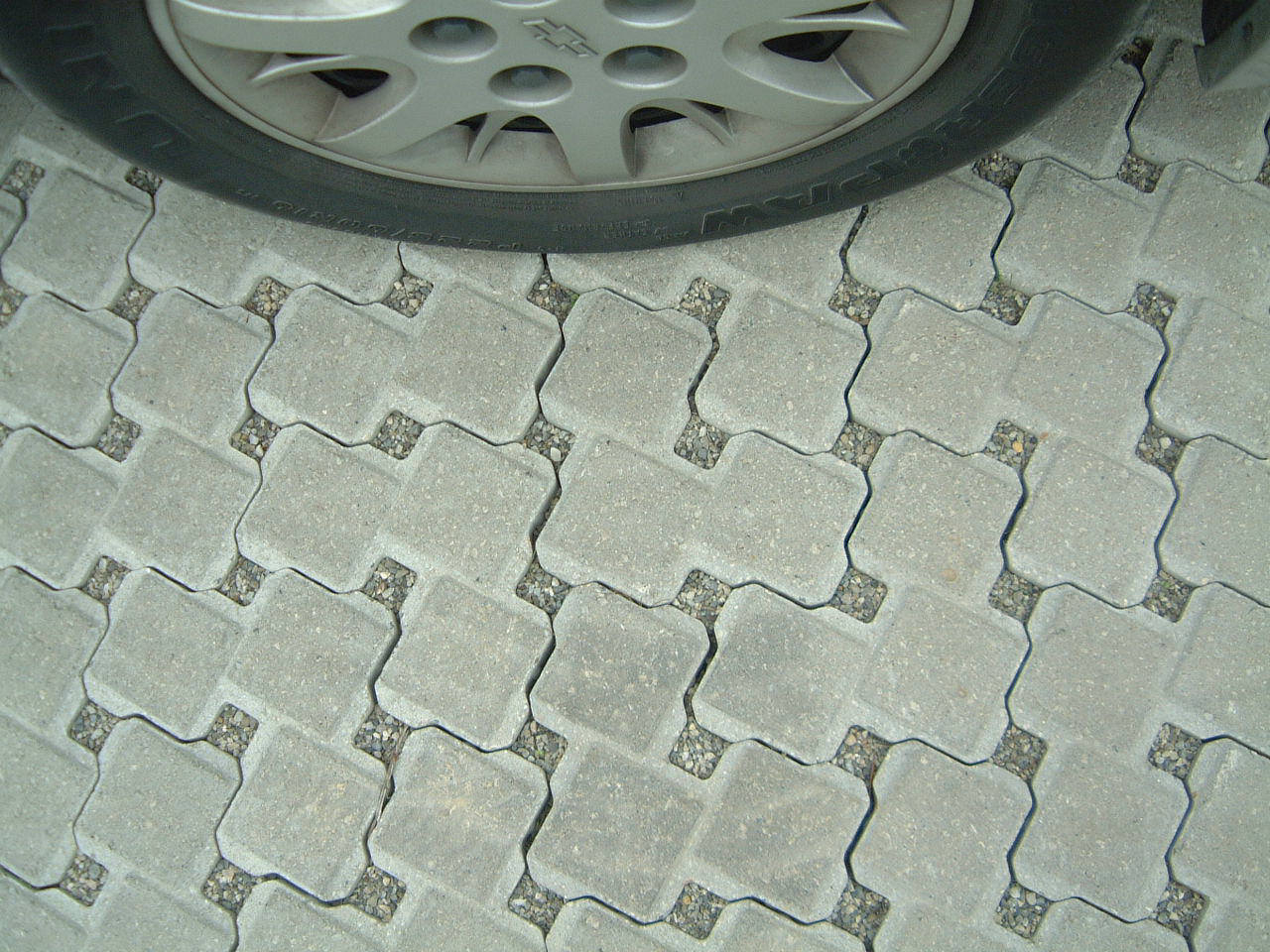
One of the most common types of driveway concrete out there is plain concrete. Also known as colored concrete when produced in colors other than the standard grey, this material is the most popular amongst homeowners. It’s known for its sleek, clean look and is usually poured in square slabs.
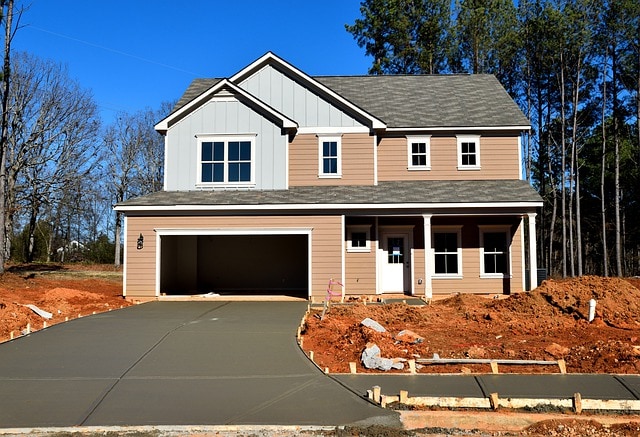
It can be poured over pretty much any surface, though certain surfaces may end up requiring more maintenance down the road. If poured over regular soil, you could experience shifting, buckling, or cracking when the ground below it inevitably moves and shifts.
This type of concrete driveway is generally long-lasting but will require resealing at least every 15 to 20 years. The best option is epoxy driveway coating, which makes concrete surface resistant to various forms of damage, chemicals, and vehicle traffic. However, it will increase the overall cost of your driveway. This is one of the reasons why concrete is a relatively expensive driveway option over the long term.
1. Concrete Mixed with Aggregate
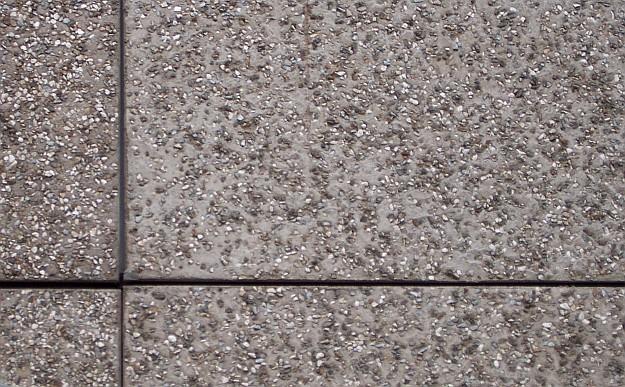
The best type of concrete for driveway aesthetics may just be concrete mixed with aggregate. This type of concrete uses regular concrete mixed with one or more types of aggregate. This could include regular gravel or multi-colored gravel.
Once poured and dried, the slabs are sanded down so that the aggregate is visible. This creates a textured, nuanced look that many homeowners prefer over the blank canvas look of regular grey concrete.
Exposed aggregate concrete, as it’s known, is similarly durable and lasts as long as regular concrete. However, the correct ratio of aggregate to concrete must be used during the pour, or else the structural integrity and strength of your driveway will suffer greatly. An improperly poured driveway of this type will often fail almost immediately, requiring a complete do-over.
2. Concrete with Stenciled Designs
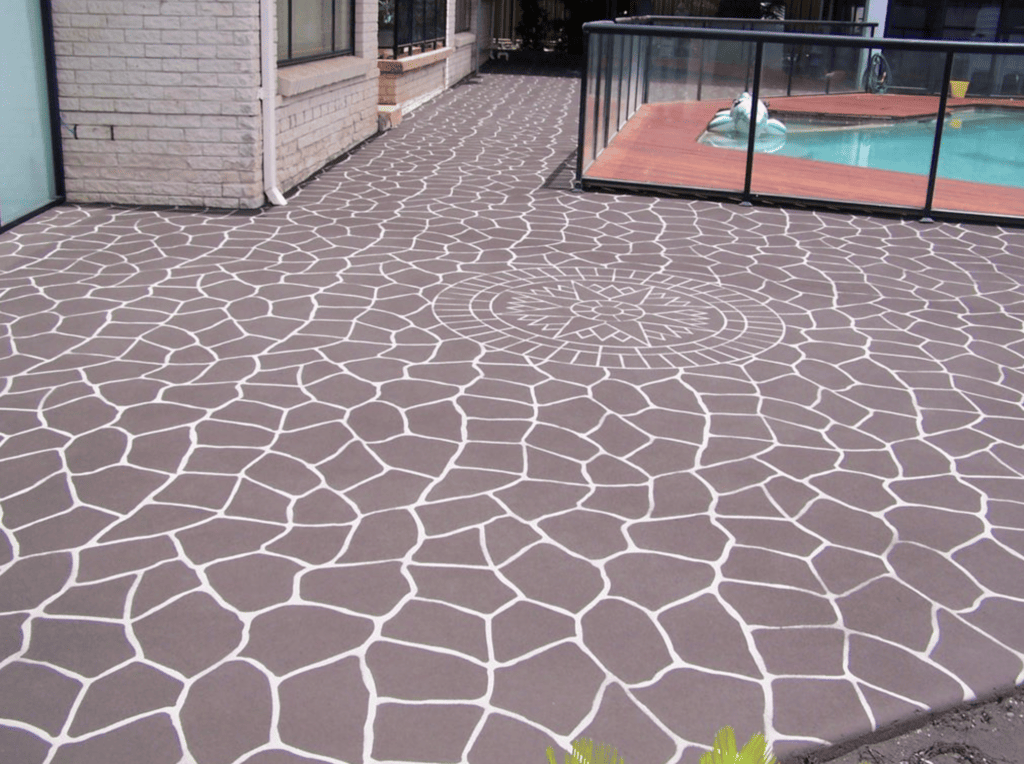
Stenciled concrete is another one of our favorite types of concrete driveways. This option is best suited for homeowners who want the functionality and color of concrete but who also want to get creative with their design. Stenciled concrete has designs stenciled into when it’s almost dry.
These can take the form of anything, really, but most often include designs that mimic the appearance of brick pavers, stone pavers, slate tiles, and many other types of common materials. Artwork and other designs are common as well, though they can easily fade away over time.
3. Slate-Styled Concrete
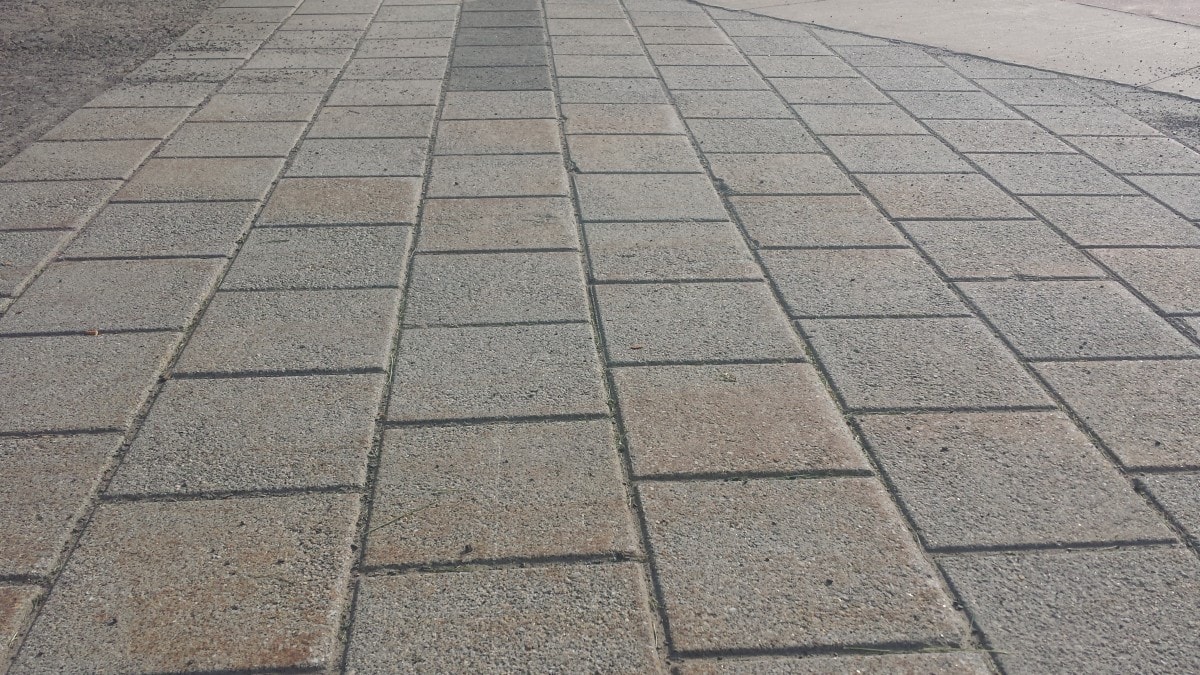
Another variation on slate-stenciled concrete is concrete that’s been stamped with slate-textured mats prior to setting. This gives it the most professional look when trying to mimic slate, even more so than stencils. Slate is very beautiful but often too brittle or expensive to use for an entire driveway, so slate-style concrete gives you the durability without any of the maintenance concerns.
4. Permeable Pavers
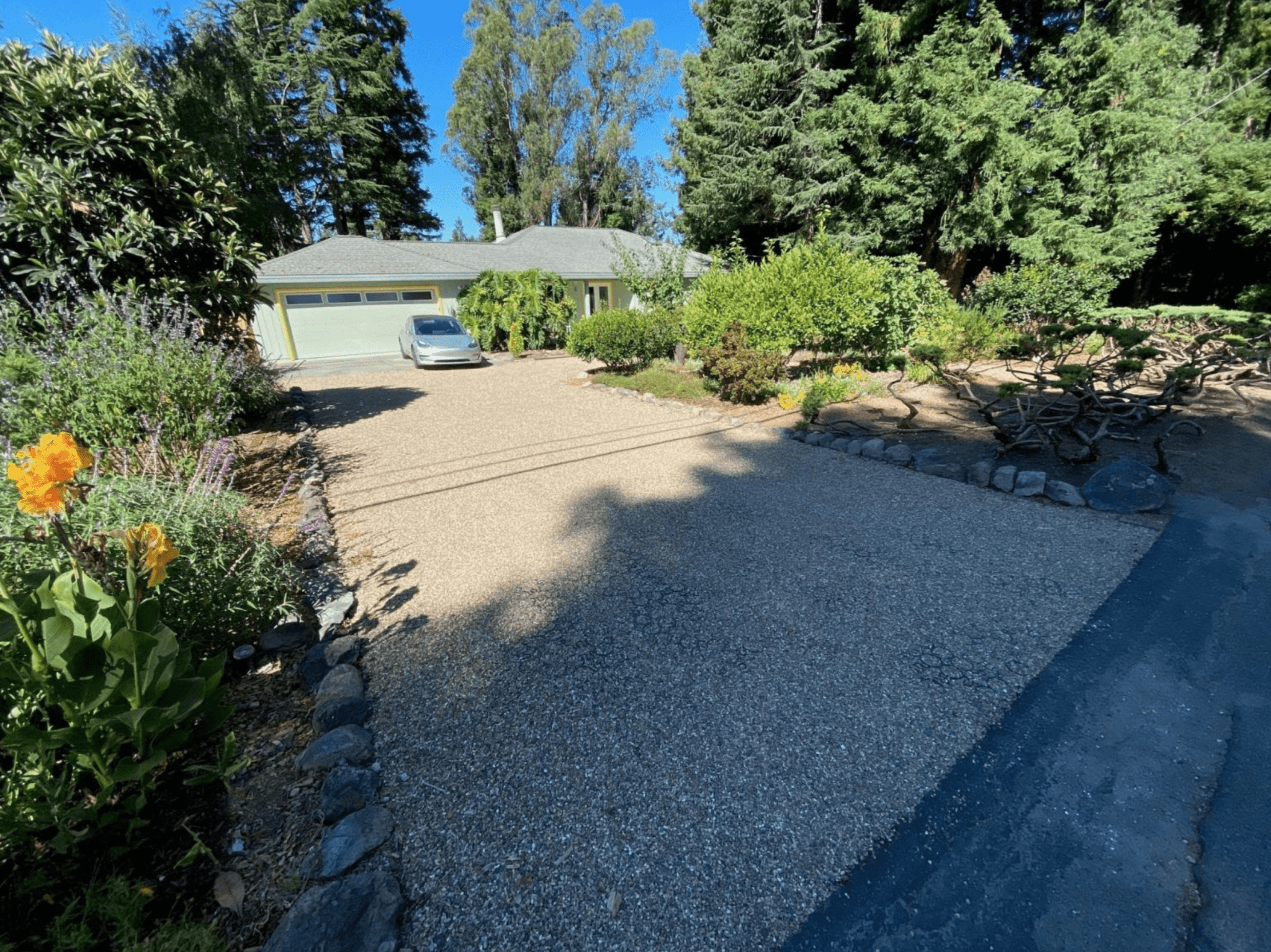
Permeable plastic pavers are the superior option to all different types of concrete driveways. You can fill them with different types of crushed concrete to create a paver/concrete hybrid driveway, and they’re far more durable. Made from 100%-recycled plastic, TRUEGRID PRO LITE and TRUEGRID PRO PLUS pavers lock in aggregates like concrete and others, preventing them from taking wear and tear.
This gives you a driveway that looks just as stylish as regular concrete but without nearly any of the maintenance required for upkeep of a concrete driveway. It also eliminates flooding issues for good, keeping your concrete driveway clean and stable.
Use TRUEGRID Pavers as a Better Alternative to Impermeable Concrete
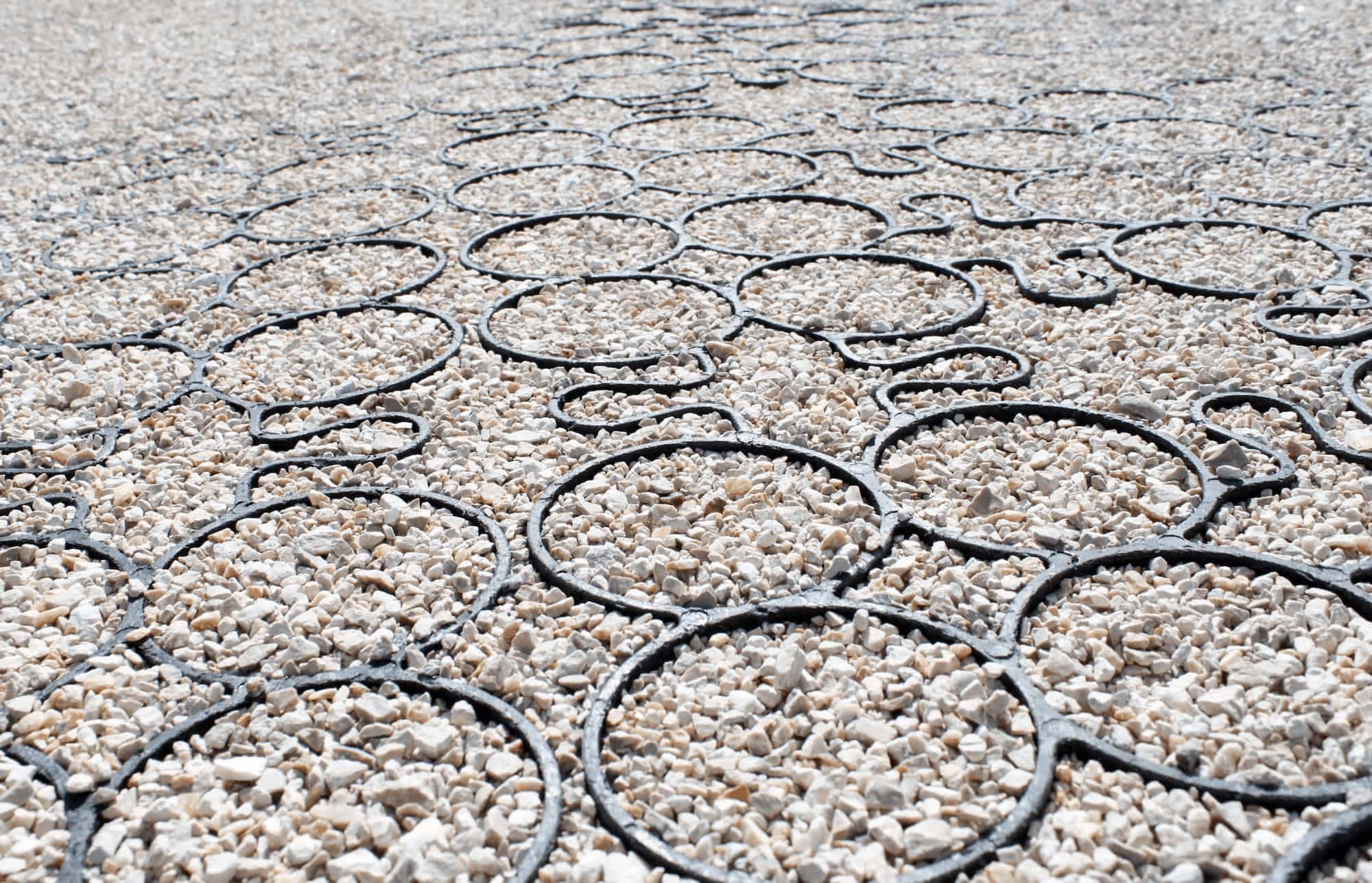
If you’re looking to install a new driveway on your property that’s going to look great, stand the test of time, and outperform concrete when it comes to durability, all while remaining eco-friendly and low-maintenance, look no further than TRUEGRID permeable pavers. If you’re thinking about building a new driveway, call the pavement professionals at TRUEGRID today for a quote.
Gravel driveways hold a certain appeal for many homeowners. Some like the versatility in terms of style and color, while others like the affordable cost of gravel. Quick installation times, permeability, and eco-friendliness are even more reasons to implement gravel as a driveway material.
Of all the reasons why people like gravel driveways, though, low-maintenance requirements aren’t one of them. Almost all gravel driveways except for one type require regular and extensive maintenance. Though generally affordable, most types of gravel driveway maintenance need to be done on a regular basis.
In case you have a gravel driveway or are thinking about installing one, let’s go over some tips for maintaining yours to keep it clean and functional. We’ll also look at a type of gravel driveway that requires almost no maintenance.
6 Tips to Best Maintain a Gravel Driveway
Gravel is made up of many small rocks, so it is very permeable, which is one of the main things people like about gravel driveways. A permeable paving material such as gravel means you don’t need to worry as much about driveway flooding or install any additional drainage in most cases.
However, in comparison to an impermeable material like asphalt or concrete, gravel needs to be regularly cleaned in a variety of ways. Leaves, dirt, and junk can get mixed in with your gravel, clogging it and preventing proper drainage.
1. Rake
If you want to know how to keep a gravel driveway clean, you’ll want to invest in a good rake. A heavy-duty rake made for gravel will allow you to sift the gravel and filter out the debris that so commonly builds up in loose gravel.
Raking can also help even out the gravel and fill in any bare spots that may have developed from wind, rain, and/or traffic. Removing this debris from your gravel driveway can also help improve the amount of traction your wheels get.
2. Use a Compactor for Potholes
Bare spots can be filled in with redistributed gravel via raking, but potholes cannot. To fix potholes you’ll need to reapply gravel and compact it with a heavy roller. If not, the same potholes will continue reappearing.
3. Forego the Snowplow
Another tip for how to maintain a gravel driveway is to avoid snowplow use in the winter. Snowplows usually catch both gravel and snow as they plow, meaning you’ll have to redistribute your gravel once the snow melts.
4. Leave One Inch of Snow
Snow is usually shoveled off of sidewalks and driveways because it drastically reduces the amount of traction that vehicle tires can get. Gravel provides a ton of natural traction.
In fact, you can leave about a full inch of snow on your gravel driveway without sacrificing traction or safety. This will allow you to avoid displacing gravel with snow shovels or plows and will help keep as much gravel in your driveway as possible.
5. Spray it Down
Gravel is easily crushed into dust over time, which can get kicked up as you drive on it. The dust can get all over your vehicle, so proper crushed stone driveway maintenance involves spraying down your driveway every now and then if it’s not already stabilized with pavers.
Loose gravel can be sprayed down with a basic garden hose. It will keep the dust weighed down and can help loosen any dirt clumps stuck in your driveway as well.
6. Stabilize Your Gravel Driveway with Pavers
The absolute best tip for maintaining a gravel driveway is to stabilize your loose gravel with pavers.
TRUEGRID permeable pavers, for instance, lock your gravel into place and can keep your driveway clean, level, and stable for up to 40 years with almost no maintenance required.
The TRUEGRID PRO LITE and TRUEGRID PRO PLUS paving systems both utilize interlocking pavers over a gravel base that can range in depth depending on the application from 0 over compacted soils to 12 inches in soft soils with needed drainage. 8 inches of gravel base is typical for most driveways. The pavers are laid over the gravel subsurface and then filled with more gravel, which is then compacted into the empty paver cells with a heavy roller or vehicle.
This installation method keeps the pavers weighed down and prevents the gravel from migrating. That way, your gravel driveway will stay almost completely debris-free and will remain fully functional for up to 60 years with very little upkeep required. You can even snow plow or snow blow it in the winter!
No Gravel Driveway is Complete without TRUEGRID Pavers
There are many ways you need to maintain a loose gravel driveway, such as raking it and spraying it down with water, among other things. TRUEGRID permeable plastic pavers, though, allow you to stabilize and optimize your gravel driveway for good.
If you want a crushed stone driveway of any shape or size that will last you a solid 4 decades with only a fraction of the maintenance that loose gravel requires, call TRUEGRID today to get in touch with a pavement professional.
Driveways can be tough to manage. Depending on what type of driveway you have, how it’s shaped, where it’s located, and what it’s made out of, you might have to invest a significant amount of time and energy into maintaining your driveway.
Driveways on a steep slope, for instance, come with their own unique set of problems and challenges. Steeply sloped driveways are sometimes unavoidable, or even desirable, despite the problems they can present.
In case you’re looking to build or renovate a driveway on a steep slope, let’s take a look at some of the best steep driveway options out there and see how they stack up against each other.
What Makes Steeply Sloped Driveways Unique?
Steep driveway surfaces are known for being much harder to manage than regular driveways. This is mostly due to erosion and the shifting of the subsurface beneath the driveway’s surface.
For starters, stormwater tends to cascade down a steep driveway, running along the sides of it and creating deep crevices through the process of erosion. These crevices can be dangerous if you accidentally step into them or drive into them. They can lead to ankle injuries, as well as suspension and axle damage to your vehicle.
Shifting of the entire driveway or even collapse in certain areas is also possible if erosion reaches all the way underneath your steep driveway. This is most common with materials like asphalt and concrete, which tend to be laid in solid pieces over the surface of the soil. They are not typically anchored to the subsurface in any way, which leaves them especially vulnerable to shifting and erosion on a slope.
Damage, or wear and tear, to the surface of materials like asphalt and concrete can also lead to water intrusion and subsurface damage to your driveway, made all the worse by its location on a slope.
The effect that gravity has on water once it reaches the subsurface of your driveway exacerbates the effects of normal erosion, leading to a driveway that can become completely compromised in a fraction of the time a level driveway would have.
This makes the need for resealing more frequent, costing you more. It also may require you to install some sort of drainage or protection on the sides of your driveway as well.
What Material is Best for a Steep Driveway?
The best material for steep driveway installation is permeable pavement. This can refer to a number of steep driveway ideas such as brick, concrete, or rubber pavers, but recycled plastic pavers perform best in all of the most important categories that a steep driveway needs them to.
Permeable pavers allow water to drain directly through them, thus preventing subsurface washouts and erosion along the sides of a driveway. Brick and concrete pavers are not ideal here, though, since they are not as durable and do not handle ice or snow very well.
Permeable plastic pavers like the kind made by TRUEGRID are the superior option for creating the best driveway for a slope. They are 98%-permeable, durable enough to last 60 years with minimal maintenance, and can deal with ice and snow effectively.
TRUEGRID PRO PLUS, combined with staking, is an effective way of preventing erosion. PRO PLUS is typically laid over a dense-graded gravel base layer of at least 6 inches in depth. Contact the manufacturer for staking and installation instructions for sloped driveways.
Once snapped into place, the empty pavers on the surface are filled with more gravel and driven over to press the gravel into the pavers. This weighs them down and prevents them from moving, even under heavy vehicle traffic.
The water that normally wreaks havoc on a sloped asphalt or concrete driveway simply drains directly through the gravel subsurface and into the soil below, making TRUEGRID pavers the best surface for sloping driveway problems. They’re also made from 100% recycled plastic, making them one of the most eco-friendly paving options on the market.
Build a Safe Steep Driveway with TRUEGRID Pavers
If you’re wondering what is the best material for a steep driveway, TRUEGRID permeable plastic pavers are the answer. They are uniquely suited to mitigate all the problems that normal steep asphalt and concrete driveways face, and are far more durable.
Resistant to UV rays as well as temperature fluctuations, these pavers are truly all-weather, all-terrain, and effective for use just about anywhere in the world. If you need to build a steep driveway and are looking to avoid erosion, flooding, costly maintenance, and durability concerns, contact a pavement professional at TRUEGRID today for a quote.

